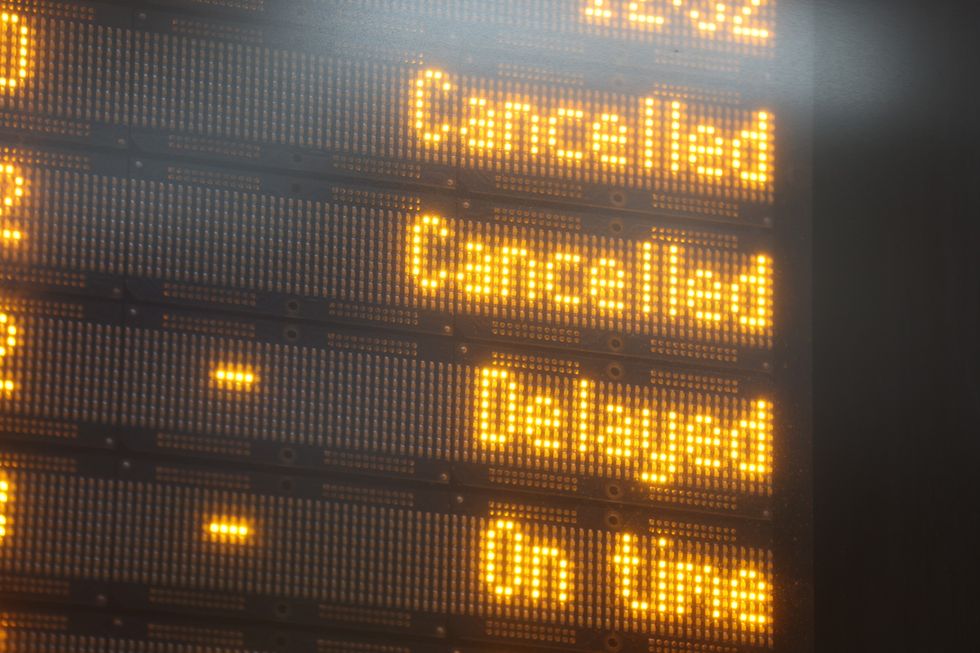Network Rail imposes new 'woke' guidance as staff told not to use words 'passenger' or 'pregnant women'
Terms like 'workmanship' and 'mankind' should be also avoided in favour of 'quality of work' and 'humankind'
Don't Miss
Most Read
Trending on GB News
Network Rail has instructed staff to stop using the words "passengers" and "pregnant woman" as part of sweeping new language guidance aimed at making communications more conversational.
The 134-page document, titled "Speaking Passenger", eliminates formal terms in favour of more everyday language.
Network Rail's chief executive Andrew Haines said: "To put passengers first, we have to speak their language. That goes for all of us. Whoever we're talking to, whatever the situation."
The changes come as Britain's railways faced 370,000 cancellations or partial cancellations in 2024, equivalent to one every 90 seconds.

Network Rail has issued new guidance to its staff instructing them not to use the phrase 'pregnant woman'
Getty
Staff have been told to replace "purchase" and "obtain" with simpler alternatives, while formal phrases like "rest assured" have also been banned.
Gender-specific language faces broad restrictions, with "pregnant women" to be replaced by "pregnant people" and both "mother" and "father" becoming "parent".
Instead of “passenger,” staff are advised to use the word “you”, while terms like "workmanship" and "mankind" should be avoided in favour of "quality of work" and "humankind".
The traditional greeting "ladies and gentlemen" has been axed, with staff instructed to use "friends and colleagues" instead.
MORE LIKE THIS:

The changes come as Britain's railways faced 370,000 cancellations or partial cancellations in 2024, equivalent to one every 90 seconds
PA
"Senior citizens" should be replaced with "older people", while "Christian name" becomes "first name" to avoid religious implications.
The guidance illustrates the change with contrasting announcements during service disruptions.
A traditional announcement might state: "All services are currently cancelled due to recent storm events. We would like to apologise for the inconvenience this may cause to your journey."
The new approach favours more conversational language: "I'm really sorry everyone but we've had to cancel all the trains this evening. A tree's fallen across the tracks just outside the station and it's going to take a few hours to clear."
Network Rail suggests this everyday language makes it "harder to feel furious" about delays.
"We don't speak Network Rail language anymore," the guidance states. "We speak passenger."
Staff have been instructed to avoid assuming customers are celebrating religious holidays.

Instead of 'merry Christmas everyone', they should say 'merry Christmas to those who are celebrating'
GETTYInstead of "merry Christmas everyone", they should say "merry Christmas to those who are celebrating" or opt for "seasons greetings" or "happy holidays".
The guidance states Network Rail has "a duty to eliminate discrimination, advance equality of opportunity, and foster good relations between different people".
The document warns that inappropriate language "can create and reinforce bias against individuals and groups of people" leading to "a work environment that's humiliating, unpleasant and alienating".
The guidance emphasises that Network Rail does not aim to mimic other brands' communication styles.
"We don't want to sound like Virgin or Innocent. That's not us. We just want to sound friendly," the document states.
A Network Rail spokesman defended the guidelines, saying: "Passengers are at the heart of our tone-of-voice guidelines, which have been in place for several years and are common practice in customer-facing organisations."








